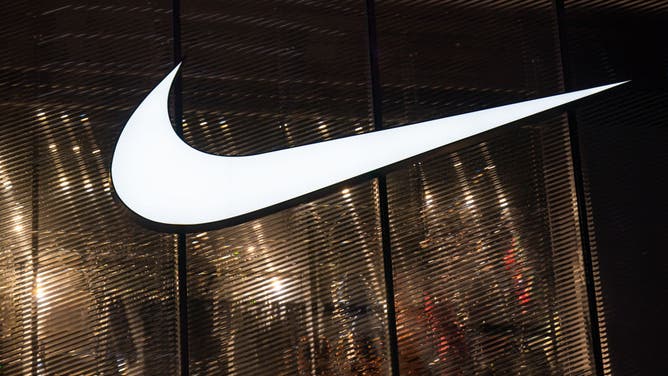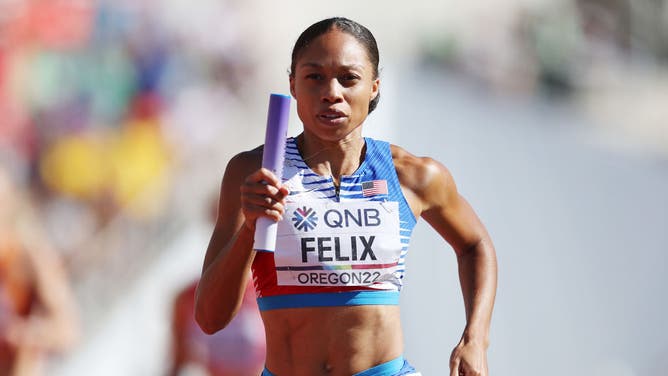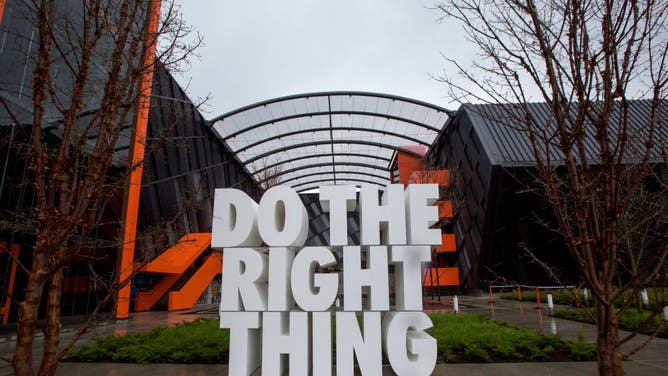Nike Continues To Fail Women With Alleged Study On Trans-Identifying Youth | Amber Harding
Nike loves to market itself as a champion for women. The brand has launched entire campaigns celebrating female athletes — complete with inspirational slogans, slow-mo footage and narrations about "empowerment" and proving the naysayers wrong. But behind the polished ads and performative hashtags is a pattern that’s hard to ignore: Nike consistently fails to actually protect female athletes.
This alleged study on transgender-identifying youth is just the latest example.
The sports apparel giant is reportedly funding a five-year study on trans-identifying male children who are being given puberty blockers and hormone therapy — all to see whether suppressing male puberty early enough can make competition in girls' and women’s sports more "fair."
But let’s call this research what it is: disturbing.
The Very Existence Of The Alleged Nike-Funded Study Proves What We Already Know
The very premise of this study is an admission that biological males have an inherent advantage over females in sports. Of course, most sane people will admit that's common sense. That’s why we have separate men's and women's divisions in the first place.
RELATED: Physicians Warn of Medical Risks In Trans Youth Study Allegedly Funded By Nike
Instead of acknowledging that boys shouldn’t be competing in girls' sports, though, this study asks, "Okay, but what if we just chemically impair them first?" It’s like asking how many dizzy bat spins we need to give Aaron Judge before he starts hitting a baseball like a high school JV player.
Except much more insidious. Horrifying. Unethical.

Nike is reportedly funding a study involving transgender-identifying youth taking puberty blockers and cross-sex hormones.
(Photo by Li Hongbo/VCG via Getty Images)
Let’s also point out what isn’t being studied. This research isn't about female-to-male transgender athletes. Nike isn't funding research on how girls who take testosterone fare in boys' sports. Because they already know how that goes.
Girls aren’t taking over men's sports and locker rooms — and no one's pretending they are. The only group asked to compromise, accommodate and surrender safety and competitive fairness is female athletes.
And that’s been Nike’s playbook for years.
Nike Has A History Of Mistreating Female Athletes
Remember Mary Cain? An elite teenage runner, she was part of the Nike Oregon Project, founded in part by coach Alberto Salazar with the goal of making American distance runners competitive with the rest of the world.
Cain later filed a lawsuit, accusing Salazar of emotionally and physically abusing her, pushing her to become "thinner, and thinner and thinner."
"I joined Nike because I wanted to be the best female athlete ever," Cain told The New York Times in 2019. "Instead, I was emotionally and physically abused by a system designed by Alberto and endorsed by Nike."
Cain says she was publicly shamed, underfed and ignored when she started breaking down — physically and mentally. In her words: "I was the fastest girl in America, until I joined Nike." According to the lawsuit, the company was aware of the abuse but failed to intervene.
"Nike was letting Alberto weight-shame women, objectify their bodies, and ignore their health and wellbeing as part of its culture," Cain's lawyer, Kristen West McCall, said. "This was a systemic and pervasive issue. And they did it for their own gratification and profit."
Sound familiar?
The Nike Oregon Project was disbanded in 2019 after the U.S. Anti-Doping Agency accused Salazar of three violations. The agency banned him from the sport for four years. The Nike-sponsored coach was later barred from the sport for life after multiple athletes accused him of sexual assault.
Nike never stepped in. Real champions for women.

Nike was forced to change its maternity policy after seven-time Olympic gold medalist left the brand and publicly called Nike out.
(Photo by Patrick Smith/Getty Images)
Then there’s Allyson Felix, Alysia Montaño and Kara Goucher — world-class athletes who said Nike slashed their pay after they got pregnant. Felix asked for maternity protections. Nike not only denied her request and cut her pay by 70 percent, but an executive also reportedly told her, "Know your place and just run."
Montaño had to keep training while hiding her pregnancy to avoid losing sponsorship.
And when Goucher got pregnant, Nike arranged a photoshoot where the company then edited out her pregnant belly and replaced it with fake abs — all while keeping her breasts, which she said had "grown significantly" during the pregnancy, as they were.
Goucher also later revealed she was pressured to race before she had healed from childbirth.
Nike eventually updated its maternity policy. But only after public shaming.
And in 2023, Nike handed a women’s sports bra endorsement to Dylan Mulvaney — a biological male with zero athletic credentials — days after Mulvaney sparked a boycott that nearly sank Bud Light. It was yet another slap in the face to female athletes: biological men modeling the gear women actually need to compete.
A costume intended to mock, not empower.
This Isn’t A One-Off — It’s A Pattern
Nike can keep churning out glittery girl-power campaigns like "So Win," producing ads with slow-mo shots of determined women crossing finish lines and sinking threes. But throwing pink glitter on something doesn’t make it female-friendly. Especially not when, behind the scenes, the company repeatedly undermines the very athletes it claims to celebrate.
You don’t get to plaster "So Win" across billboards while funding research that asks how much we need to medically stunt boys so they can take spots on girls' podiums. That’s not empowerment. That’s exploitation. Erasure.
This alleged study is not an outlier. It’s the logical next step in a long pattern of Nike treating women like props — useful for marketing, disposable when inconvenient.

Nike should take its own advice here.
(Photo by Natalie Behring/Getty Images)
Despite what some activists might have you believe, this transgender research isn’t some noble quest for inclusion. It’s a science experiment using kids, and its only outcome is to clear the path for males to keep entering women’s sports. There’s no upside for female athletes. No consideration for their fairness, safety or scholarship opportunities. Just more sacrifices made in the name of "progress."
Nike doesn’t support women. It sells the illusion of support to people who don't look too closely.